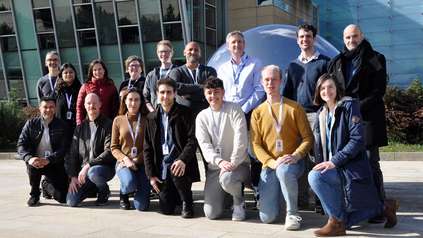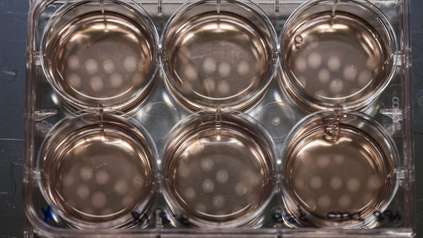Precision drug could target hard-to-treat cancers
Listen to “Precision drug could target hard-to-treat cancers” on Spreaker.
Scientists have developed a promising new inhibitory drug aimed at treating certain stubborn cancers, offering hope for patients who have exhausted other treatment options, and potentially paving the way for targeted, less toxic treatments.
The drug is designed to block a protein called Werner Helicase (WRN), which is crucial for the survival of specific types of colorectal, endometrial, and gastric cancers.
Researchers from the Wellcome Sanger Institute, and their collaborators at GSK and IDEAYA, showed in laboratory tests that the treatment approach killed cancer cells while leaving healthy cells unharmed. These tests included experiments on mini-tumours grown from patient samples that had stopped responding to existing treatments.
The findings, published recently in Cancer Discovery, provide support that targeting the WRN protein may not only treat these cancers, particularly in patients unresponsive to current therapies, but also has the potential for fewer side effects compared to traditional chemotherapy.
The researchers also identified biological markers that could help doctors predict which patients may benefit most from this treatment.
The next phase would involve testing WRN-targeted inhibitors in clinical trials with cancer patients. If successful, this approach could offer a new treatment option for patients with these specific cancer types, potentially improving their health and quality of life.
This work is part of the Cancer Dependency Map project1, which aims to identify weaknesses in every type of cancer to guide the development of targeted treatments.
Around 42,900 people are diagnosed with bowel cancer, also known as colon cancer, in the UK each year, and it is the fourth most common cancer nationwide2. Bowel cancer as well as other types of cancer that affect the uterus and stomach, share a characteristic called microsatellite instability, or MSI. In these cancer cells, the DNA repair mechanisms malfunction, causing a build-up of genetic errors. This instability is particularly common in colon cancer, affecting 10 to 15 per cent of cases3.
These cancer types can be challenging to treat, especially when they become resistant to existing therapies. Previous research by the Wellcome Sanger Institute, Open Targets and collaborators revealed that the WRN protein plays a critical role in these forms of cancer4.
In this study, the team used advanced genetic editing techniques, including CRISPR-Cas9, to identify the most crucial parts of the WRN protein for the survival of cancers showing microsatellite instability. They created potent and highly selective inhibitors targeting this – the WRN helicase. These were tested in laboratory settings, both in cell cultures and in mice, plus organoids made using human tissue from patient’s tumours that had previously been unresponsive to immunotherapy.
The researchers also identified measurable biomarkers that could help predict which cancers might respond best to this treatment5.
These results are encouraging and provide a foundation for moving forward with human clinical trials evaluating drugs that target WRN.
“The development of this inhibitor not only paves the way for future clinical trials but also provides a valuable tool for studying WRN biology. This could lead to further insights and therapeutic strategies not only for cancers showing microsatellite instability but potentially for other conditions involving DNA repair deficiencies.”
Dr Gabriele Picco, first author of the study at the Wellcome Sanger Institute
“What sets this treatment apart is its precision, targeting specific weaknesses in cancer cells rather than just attacking based on the cancer’s location. Our findings highlight the importance of mapping cancer’s vulnerabilities through projects like the Cancer Dependency Map. This approach brings us closer to our vision of developing more targeted and effective cancer treatments, with fewer side effects for patients.”
Dr Mathew Garnett, senior author of the study at the Wellcome Sanger Institute and Open Targets
More information
Notes to Editors:
- The Cancer Dependency Map is an international collaboration between the Wellcome Sanger Institute and the Broad Institute in the United States. The results of the first iteration of the Cancer Dependency Map were published in 2019. The Cancer Dependency Map at the Sanger Institute is a project that aims to assign a dependency to every cancer cell in a patient, which could be exploited to develop new therapies. It is linked with the Open Targets initiative to facilitate new drug target identification. Projects developed by the Open Targets consortium have supported elements of the Cancer Dependency map to facilitate new drug target identification inclusive of this research. https://depmap.sanger.ac.uk/
- https://www.cancerresearchuk.org/about-cancer/bowel-cancer/about-bowel-cancer [accessed 9 August 2024]
- Vilar E, Gruber SB. et al. (2010) Microsatellite instability in colorectal cancer-the stable evidence. NatRev Clin Oncol. 7:153–62.
- Picco et al. (2021) ‘Werner Helicase Is a Synthetic-Lethal Vulnerability in Mismatch Repair–Deficient Colorectal Cancer Refractory to Targeted Therapies, Chemotherapy, and Immunotherapy’ Cancer Discovery DOI: 10.1158/2159-8290.CD-20-1508.
- These biomarkers are related to the presence of certain genetic markers (TA-repeat expansions) and alterations in mismatch repair genes. This is because the protein WRN helicase helps cells cope with the stress caused by expanded DNA repeats, particularly repeats of the nucleotides thymine (T) and adenine (A).
Publication:
G. Picco et al. (2024) ‘Novel WRN Helicase Inhibitors Selectively Target Microsatellite-Unstable Cancer Cells.’ Cancer Discovery. DOI: 10.1158/2159-8290.CD-24-0052
Funding:
This research was supported by Wellcome and Open Targets. For full funding acknowledgements, please refer to the publication.





